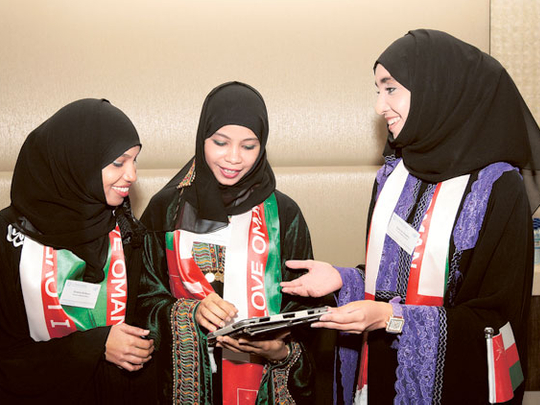
Abu Dhabi:Tourists looking for first-hand information about the UAE, and software users who want access to computer processing capabilities, are the intended beneficiaries of a number of innovative business ideas that could be realised in Middle East and North Africa (Mena) region over the next few years.
The ideas were presented on Sunday in the capital at the Intel Business Challenge – Mena 2013, which promotes entrepreneurship and creativity among university students in the region. The event, which was organised by Intel and hosted by the Abu Dhabi Education Council (Adec), is also expected to help create a knowledge-based economy, Dr Amr Elchouemi, manager of the research promotion section at the Adec, told Gulf News.
“One of our main goals at the Adec is to build a skilled workforce, and the Intel Challenge achieves this by encouraging students to come up with viable new ideas. This is the first time that the UAE is participating in the competition, and we saw interest from 36 different teams around the country. Among them, four were selected to participate in the Mena region finals,” said Dr Elchouemi.
The finals saw the UAE-based teams go up against 21 others from the Mena region. Eventually, four teams were selected as winners. Apart from being awarded prize money for their business projects, they will now go on to participate in the Intel Global Challenge at Silicon Valley in October 2013.
Dr Elchouemi added that the Adec hoped to see greater participation from UAE teams in next year’s Intel Challenge, especially as students can benefit from free educational workshops to refine their ideas.
Zakaria Bin Hamoudie’s project, entitled Exa.io, which hopes to provide affordable computer processing capabilities for software users on a cloud system, won first prize at the contest. The 25-year-old Algerian software engineering student, who had travelled from Bahrain, said the idea would help people use cloud-based systems without having to purchase expensive hardware. Bin Hamoudie developed the system along with two other team members.
Alaeddine Mokri, 27, was the only UAE-based winner among the top four.
“My project focuses on a computer chip that can be added to smartphones to enhance their functionality. For example, the chip can currently be used to read complex graphs, perform 3-D scanning, or convert the smartphone into an advanced computer mouse. In future, I hope to add functions that will aid designers of solar cells,” said Mokri, a solar energy PhD student at Masdar University.
Although they did not win an award for their idea to develop a smartphone application that could help UAE tourists and newcomers, Maha Al Hosani and her six team members from Zayed University were confident that it is a promising venture.
“The app which we are building tells tourists what to do and what to avoid in the UAE, and also explains our traditions to them. We decided to work on this as we have come across many visitors who are confused with the UAE’s norms. Moreover, other guide books that are available are either too hefty to consult at all times, or are developed by non-Emiratis,” said Maha, a 21-year old Emirati who is in her fourth year at university.
The team said it would continue working on the project until the application could be made available to smartphone and tablet users.
“We hope to make it interactive, and offer users experiences such as a chance to attend an authentic Emirati wedding,” they added.












